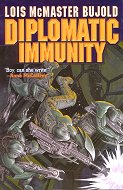
Diplomatic Immunity
Lois McMaster Bujold
367 pages
published in 2002
Rereading Diplomatic Immunity on the heels of Komarr and A Civil Campaign drove home how conventional and slight it was compared to those two novels. It’s as if Bujold, having lost her nerve after having written two somewhat unusual novels, decided to go back to a tried and true formula of getting Miles into trouble and letting him dig his way out of it. Of course, she had also started her fantasy series at this point, so a more charitable explenation is that she had simply lost interest in Miles Vorkosigan and only wrote this to please her fans.
In any case Diplomatic Immunity is a bit disappointing. Nothing wrong with it as a story, but it misses the sociological insights and character depth of the previous two novels. What’s more, we only see things from Miles’ point of view, again unlike Komarr and A Civil Campaign. Which means that Ekaterin is demoted from co-protagonist to supporting character and worse, barely present. It’s Miles’ show all the way and Ekaterin is only there to lend moral support. Which is a criminal waste: she is what made Komarr and A Civil Campaign so good, as intriguing and strong a character as Miles himself. This novel would’ve been so much better if Bujold had let Ekaterin play an equal important part in the plot as Miles.
The plot itself is discussed in my original review. Sufficient to say that I’d largely forgotten it in the six years since. It’s compelling enough while reading, but ultimately on the slight side. I think I was right to describe it then as an exercise in nostalgia, a last look at Miles before Bujold went on to greener pastures, even though a new novel, Cryoburn has been published since.